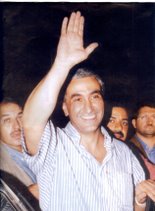
As anniversary of Hezbollah commander Mughniyah's assassination looms, Israel tightens security....LOL ROTFL....
By HK
| | |
| Hezbollah's leader, seen by video last month in Beirut, says it is 'necessary' to respond to commander Mughniyah's killing. |
BEIRUT, Lebanon - When Imad Mughniyah, Hezbollah's top military commander, was assassinated by a car bomb in Damascus one year ago, the militant Shiite group blamed Israel – which denied involvement – and vowed revenge. But a year on, that vow remains unfulfilled, because Hizbullah know well that Asef Shawkat is the Assassin in Chief and the Architect in chief of Imad Moughniah's assassination...which was "sold" through the White House Murder INC, for plenty of good will at the upcoming tribunal ....
While Israel is taking no chances and has tightened security ahead of the Mughniyah anniversary, Israeli officials repeatedly have claimed that threats of massive retaliation to a Hezbollah revenge attack have deterred the Shiite group.
"On the one hand, Hezbollah is driven by its desire to carry out an attack as revenge for the death of Mughniyah ... but they do not want to start a war," Maj. Gen. Amos Yadlin, Israel's military intelligence chief, told the Israeli cabinet in a briefing two weeks ago.
Deterrence and counterdeterrence have shaped the Israeli-Arab conflict for decades. Israel relies on the threat of overwhelming military force to cow its Arab enemies. While its military superiority in the past has dealt crushing blows to Arab conventional armies, Israel has struggled to find a means of deterring a new generation of enemies, the smaller sub-state guerrilla movements exemplified by Hezbollah and Hamas.
"These guys are not intimidated by the Israelis," says Timur Goksel, former senior official with the UN peacekeeping force in south Lebanon. "They are ideologically driven and don't have the same responsibilities as a state."
That is why many analysts in Lebanon believe that Hezbollah will respond to Mr. Mughniyah's assassination with a calculated strategic blow to deter further assassinations and restore a balance of deterrence between the two foes.
"The retaliation is a strategic necessity for Hezbollah. In fact, it would be suicidal if Hezbollah did not respond," says Amal Saad-Ghorayeb, a Lebanese specialist on the group.
Analysts say Hezbollah's targeting and timing of a retaliation is more dependent on its multiple, sometimes conflicting, obligations toward its Lebanese Shiite constituents, domestic political allies, ideological interests, and backers in Syria and Iran. Few doubt that a reprisal will come.
"It is necessary to respond to the killing of martyr leader ... Mughniyah to punish the killers," said Sheikh Hassan Nasrallah, Hezbollah's leader, in a press conference two weeks ago.
Israel's deterrent capability has suffered several blows in recent years. Hezbollah's bombs and bullets drove the Israeli army out of south Lebanon in 2000. Six years later, Israel failed to defeat Hezbollah's battle-hardened guerrillas in a month-long war. The recent three-week onslaught against Hamas in Gaza was, in part, an attempt to show it had learned the lessons of the 2006 war. But with rockets still being fired into Israel nearly a month after the cease-fire, many military analysts question whether the offensive succeeded in restoring Israel's deterrence.
A report released this month by the Center for Strategic and International Studies concluded that while the Israeli army performed more effectively in Gaza than in Lebanon, its tactical gains against Hamas were short-term and no clear strategic benefit was achieved.
"Israel does not seem to have been properly prepared for the political dimensions of the war, or to have had any clear plan and cohesive leadership for achieving conflict termination," wrote military analyst Anthony Cordesman. "Moreover, it seems to have approached the fighting, and the Arab world, from a strategic perspective that will increase instability in the region and ultimately weaken Israel's security."
Hezbollah long ago recognized the value of deterrence. A month after Israel killed Hezbollah leader Sheikh Abbas Mussawi in February 1992, a suicide bomber blew up the Israeli Embassy in Buenos Aires, killing 29 people. While Hezbollah denied responsibility, Israel refrained from assassinating top Hezbollah figures for the next 16 years.
During Israel's occupation of south Lebanon in the 1990s, Hezbollah fired rockets into Israel whenever Israeli forces caused Lebanese civilian casualties. The tit-for-tat tactic helped impose restrictions on the Israeli army's freedom of action in south Lebanon.
After Israel withdrew from Lebanon in 2000, Hezbollah staged periodic attacks against an Israeli-occupied sliver of mountainside called the Shebaa Farms. The attacks were calibrated to needle Israel without eliciting heavy reprisals that could backfire on the party's domestic standing. Similarly, Israel for six years adopted a policy of restraint, recognizing that a disproportionate response would draw rocket salvos on northern Israel.
That "balance of terror" was upset in July 2006 when Hezbollah fighters abducted two Israeli soldiers and Israel responded with war.
Since 2006, Hezbollah and Israel have tried to establish new means of deterrence. Israel has warned that it will flatten Hezbollah-supporting areas of Lebanon in the event of another war. And it remains the chief suspect in Mughniyah's killing, suggesting it has abandoned its moratorium on targeting senior Hezbollah officials.
Though Hezbollah has frozen its attacks on the Shebaa Farms, it has mounted a rearmament, recruitment, and training drive and drawn up fresh battle plans. Israeli intelligence says Hezbollah has amassed three times the number of rockets it had at the start of the 2006 war.
"The Zionists will discover that the war they had in July [2006] was a walk in the park if we compare it to what we've prepared for every new aggression," Sheikh Nasrallah warned in January.



